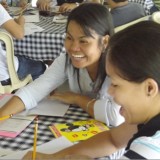
ERI Team member Peter Harney visited the Philippines in February to conduct two training workshops, one in Maasin and the other in Kabankalan. The latter was held at the San Columbano Retreat and Conference Center, on, 21-23 February, 2013. Here is a report from Br Rod Ellyard who facilitated the workshop:-
Those who attended the training included seventeen teachers, five members of the Negros Nine Foundation (an NGO involved in anti-human trafficking and other social support activities), five members from Edmund Rice Services, (an association whose purpose is to assist those made poor to uplift their lives), two members of the Rural Missionaries of the Philippines, two members involved in the Catholic Church Social Action Group and an advocate on behalf of Indigenous Peoples: comprising twenty-eight Filipinos and four Australians – making thirty two in all.
On Day One, the training defined Advocacy, broadened the concept to principles, used inclusive processes, clarified assumptions, showed advocacy at work at the local, national and international levels and made the link to human rights for each. This led to a deeper understanding of Human Rights and connected back to the work involved in advocating for these rights. The work of ERI was then explained.
Day Two explored advocacy resources and built an understanding of how to design an advocacy campaign, reviewing the critical issues and associated rights. Information on the Human Rights Council (UPR) and the Human Rights Council review of the Philippines followed. Participants identified 15 current issu
es of concern, prioritized the top seven and developed Group Action Plans. The seven advocacy groups formed around issues of:- 1.Indigenous Peoples, 2. Election Related Corruption, 3. Watershed Destruction, 4. Inequity of teachers’ salaries: Public Vs Rural Private Schools, 5. Women’s issues – domestic violence, broken families, etc, 6. Public Schools forcing poor children to pay ‘Voluntary’ Fees, 7. Drugs in Schools.
On Day Three Basic rights took in matters of Eco-justice or Earth Rights and aspects of Human Rights Education. Time was allowed for completing the Advocacy Action Charts, networking and setting target dates. The wisdom of the group was harvested, and the workshop was evaluated.
Sample evaluation comments include:
“I have a new confidence in doing my work in social action for the diocese.”
“I came to appreciate the importance of human rights and how people are enabled to enjoy their rights. I learnt we have to be informed and take a stand for human rights.”
“A RBA (Rights based Approach) reinforced my commitment as a Christian in the world working for a better world community. We have come to know how to assist the most vulnerable through working an advocacy campaign.”
“I became aware of the work of the Universal Periodic Review (UPR) and how its recommendations have begun to have an impact on policies in my country.”
“I learnt that there are many human rights violations within the Philippines. Working in the area of human rights can be very risky and complex yet through partnerships with like-minded people the burden is lightened.”
“I will encourage my students to actively get involved in issues concerning human rights. We will meet as a group to ensure our plan assist broken families find their voice is completed.”
“Advocacy is new to me so I will take time to deepen my understanding of this approach. There is need to communicate advocacy campaign to others especially duty bearers. Gather advocates; organize networks; conduct advocacy campaign; invite like-minded groups to participate; regularly meet; implement anadvocacy plan.”